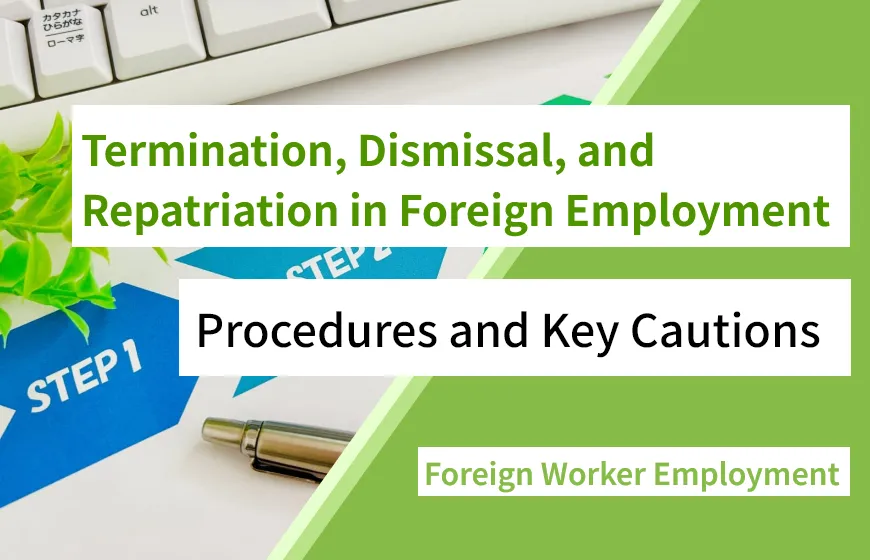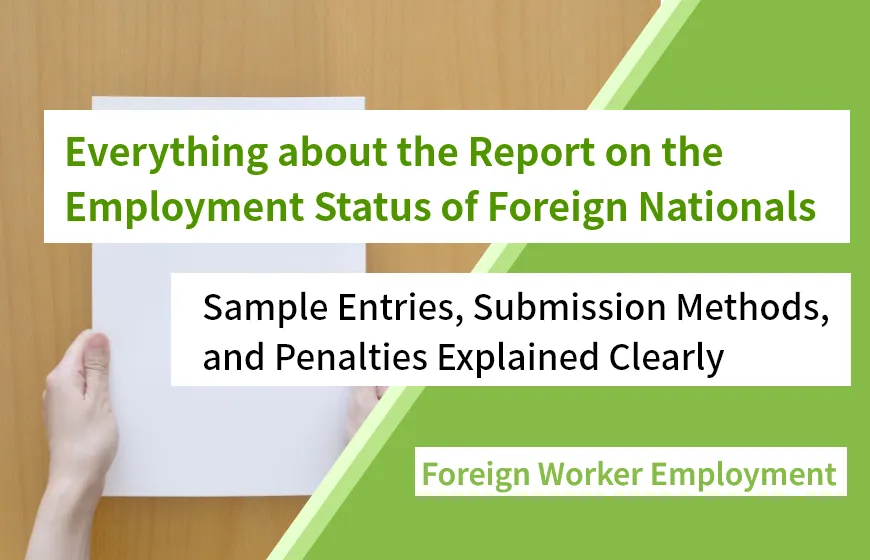
For companies employing foreign workers, termination, dismissal, and repatriation are unavoidable. Unlike Japanese employees, handling these matters for foreign workers involves additional complexity—immigration status, labor laws, and social insurance. Inadequate handling can trigger disputes or administrative guidance. This column explains the must-know points from a labor and social security attorney’s perspective.
まずはお気軽に無料相談・
お問い合わせください!
目次
1. What Are the Procedures for Resignation, Dismissal, and Repatriation?
In foreign employment, procedures around resignation, dismissal, and repatriation are closely tied to immigration status, the Immigration Control Act, and labor laws. Treating them the same as for Japanese employees can cause unexpected violations or disputes. This chapter details the basic flow and practical points to check.
1-1. Resignation Procedure Flow
The basic flow resembles that for Japanese employees, but there are foreign-specific points. HR should follow the steps below, with added attention to issues unique to foreign employees.
① Receive the resignation letter and confirm intent
Start with receiving the employee’s resignation letter and confirming intent.
A written resignation is not legally mandatory, but requiring it helps prevent later disputes.
For foreign workers, clearly verify in a language they understand that the resignation is truly voluntary. Obtain a signature (and seal if applicable), and state the date and reason.
② Set the final working day under the employment contract
Confirm contract and work rules concerning notice periods, then fix the final working day.
Hear the employee’s wishes and decide by mutual consent to avoid disputes.
Align schedules with the period of stay and any job change plans. Where a job change is planned, support a smooth transition.
③ Confirm return of company property
Check the return of all items (PC, uniform, ID card, IC card, etc.).
For remote workers or those already preparing to repatriate, plan the method and timing of returns carefully.
④ Prepare EI loss filing and separation notice
File the Notification of Loss of Employment Insurance Insured Status with Hello Work and issue the Separation Notice (Rishokuhyo) needed for unemployment benefits.
※Deadline: within 10 days after resignation.
⑤ Handle social insurance and resident tax
Submit HI/EPI loss notifications to the Pension Office.
Collect and return the HI card together with filings.
Resident tax: even if the worker repatriates, any unpaid resident tax must be settled via special collection from payroll.
Year-end adjustment usually does not apply issue the withholding slip (Gensen Choshu-hyo).
Source: 「Japan Pension Service」”Procedures for Loss of Health Insurance and Employees’ Pension Insurance Eligibility When an Employee Resigns or Dies”
⑥ Pay final wages and retirement allowance
In the final payroll, accurately settle unpaid wages, overtime, and unused paid leave. If a retirement allowance policy applies, pay according to the rules.
1-2. Key Cautions in Dismissal
Dismissal of foreign workers carries additional risks related to immigration status and differing interpretations of contracts. If deemed unfair, dismissal can be voided, damages awarded, and reputational harm amplified online. Coordinate with professionals.
① Grounds for dismissal must be reasonable and socially acceptable
Under Labor Contract Act Art. 16, dismissal is void without “objective reasonableness” and “social appropriateness.”
Keep records (performance, guidance, evaluations) that substantiate reasons; reflect them concisely in the dismissal notice.
② Statutory notice or payment in lieu
Labor Standards Act Art. 20 requires 30 days’ prior notice or 30 days’ dismissal notice allowance. This also applies to foreign workers. Even for disciplinary dismissal, rules must be explicit in the work rules and properly communicated.
③ Obligation to issue a Certificate of Reasons for Dismissal
If requested, promptly issue a Certificate of Reasons for Dismissal (LSA Art. 22).
It may be used for immigration or job-search purposes avoid ambiguity, false statements, or emotional wording.
④ Risk exposure in unfair-dismissal disputes
If contested, companies may face labor tribunal/litigation, administrative complaints, and online backlash.
Communication failures (“no interpreter,” “no records”) often fuel disputes. Prepare documentation and protocols with a sharoushi/lawyer.
⑤ Mind the link to immigration status
Employers must file the Notification of End of Acceptance (contract termination) to the Immigration Services Agency after dismissal; failure can invite administrative action.
※It is also advisable for companies to provide explanations and guidance according to each situation and to establish a system that can appropriately support foreign employees.
Dismissed workers may face visa renewal difficulty or status loss. If they wish to remain, they must apply for status change or a job-seeking status as appropriate. Provide explanations and, where possible, guidance materials.
1-3. Procedures upon Repatriation
When a foreign worker resigns and leaves Japan, tasks span immigration, daily life, tax, and social insurance. These burden the worker and also implicate the employer’s responsibility.
① Confirm status of residence and period of stay
Losing a job may jeopardize a work-authorized status (e.g., Engineer/Specialist in Humanities/International Services).
Employers must submit the Notification on Acceptance of a Mid- to Long-Term Resident (upon contract end) to the ISA within 14 days (online or paper).
※Reference: Immigration Services Agency, “Notification on the Acceptance of a Mid- to Long-Term Resident”
Days permitted to remain after notice
Depending on status and circumstances, the worker may be allowed to remain until the permitted stay expires or up to 90 days from status loss to prepare for departure or job search.
※If staying, promptly apply for a status change.
② Air ticket arrangements and who pays
Follow the employment contract/conditions.
For some statuses (e.g., Specified Skilled Worker), employers may be required to bear repatriation costs. Confirm the legal scheme and contract.
③ Housing/utilities termination
Where the company arranged housing, handle termination, move-out dates, and deposit refunds.
Even for personal contracts, consider multilingual support for terminating utilities/mobile, to prevent issues.
④ City hall filings and My Number card
Before departure, file a moving-out notice, withdraw from National Health Insurance/National Pension if applicable, and return the My Number card.
※depending on whether the departure is temporary or permanent.
⑤ Taxes/social insurance settlement and refunds
Settle any outstanding resident or income taxes via special collection.
For EPI enrollees, advise on the Lump-sum Withdrawal Payment (subject to conditions) and assist with documentation and overseas bank details.
⑥ Airport exit procedures
At departure immigration, the Residence Card must be surrendered.
Provide multilingual guidance in resignation briefings to avoid omissions.
2. Common Disputes and Countermeasures
In foreign employment, there is a risk of disputes arising from insufficient understanding of laws as well as cultural and language differences.
This section highlights common trouble cases at the time of contract termination with foreign workers and explains the key points from a Labor and Social Security Attorney’s perspective.
2-1. Case Study 1: Unfair Dismissal
Case:
A foreign worker was suddenly dismissed for “work mistakes.”
The company had no documentary evidence (evaluations, guidance logs) and issued no dismissal notice. A labor tribunal found the dismissal invalid and ordered back wages and compensation.
Risks:
- reinstatement
- back pay, tribunal
- litigation costs, reputational harm online.
Causes:
lack of documented reasons; deficient evaluation system/work rules; missing notices.
Countermeasures:
- consult sharoushi/lawyer in advance
- document guidance and evaluations
- properly issue notices/certificates
- explain procedures in plain language/multiple languages.
2-2. Case Study 2: Unpaid Wages
Case:
After repatriation, a former worker claimed unpaid overtime to the Labor Standards Inspection Office.
Poor time-record controls meant the company could not rebut the claim and had to pay arrears plus delay damages; cross-border payment complicated matters.
Risks:
- arrears and delay damages
- corrective guidance, reputational
- sourcing harm.
Causes:
weak timekeeping; poor multilingual pay explanations; no final settlement check.
Countermeasures:
- robust timecards/shifts
- multilingual payslip explanations
※It is better to be wrriten by mother tounge. - written final settlement confirmation
- periodic payroll reviews by a sharoushi.
As noted above, labor disputes involving foreign workers are mainly caused by a “lack of understanding of the system” and “deficiencies in internal management structures.”
To prevent such disputes in advance, companies should conduct regular labor audits and document checks, clearly present working conditions in multiple languages, and proactively consult with specialists such as Labor and Social Security Attorneys whenever uncertainties arise.
3. Benefits of Consulting a Sharoushi
The employment of foreign workers involves a complex area where multiple legal frameworks overlap, including the Labor Standards Act, the Immigration Control Act, and the social insurance system.
Incorrect handling can lead to serious risks such as administrative guidance, labor disputes, or damage to corporate reputation.
In such situations, a strong ally is the Labor and Social Security Attorney, a specialist in labor management and legal compliance.
This section explains the concrete benefits of consulting with or engaging a Labor and Social Security Attorney.
Mitigation of Legal Risks
- We help establish lawful grounds for dismissal and provide guidance on drafting notices, protecting the company from disputes.
- A labor and social security attorney (sharoushi) well-versed in the Labor Contract Act, the Labor Standards Act, and the Immigration Control and Refugee Recognition Act can pre-check legal risks such as wrongful dismissal of foreign nationals and unpaid wages.
Accuracy and Streamlining of Procedures
- We accurately handle complex practical tasks such as filings with Hello Work (Public Employment Security Office), procedures for loss of insured status, and preparation of the Certificate of Separation (rishokuhyō).
- We also handle procedures unique to the employment of foreign nationals, including notifications to the Immigration Services Agency of Japan regarding contract termination, etc.
Support When Disputes Arise
- We provide appropriate advice on negotiation strategies with employees.
- We offer risk management in case of emergency, including responses to the Prefectural Labour Bureau and preparation for labor tribunal proceedings and litigation.
Provision of Up-to-Date Information
- We supply the latest information on amendments to labor and immigration laws and on recent court/tribunal precedents.
- This contributes to stronger compliance and greater transparency in corporate operations.
Practical, Business-Specific Advice
- We propose measures tailored to each company’s realities, such as industry, workforce composition, and the ratio of foreign employees.
- When handled by a sharoushi experienced in employing foreign nationals, advice can incorporate considerations unique to foreign workers (language support, cultural gaps), ensuring practicable, on-the-ground solutions.
Though fees apply, prevention, efficiency, and compliance typically yield higher returns—especially in foreign employment where proactive readiness is essential.
4. Conclusion
Procedures related to the resignation of foreign workers are not merely routine HR tasks; because multiple legal regimes intersect—status of residence, labor law, social insurance, and tax—they form a complex field for both the foreign national and the employer.
That said, by consulting and engaging a labor and social security attorney (sharoushi) with strong expertise in foreign-employee matters, these complicated procedures and operations can be carried out smoothly while keeping legal risks to a minimum. Make active use of a sharoushi for practical, on-the-ground advice, preparation and organization of documents, and support in the event of disputes, so that your future employment of foreign nationals proceeds more securely and seamlessly.
We hope this article will assist your company in handling “resignation, dismissal, and repatriation” in the context of employing foreign workers.
この記事の監修者
社会保険労務士法人第一綜合事務所
社会保険労務士 菅澤 賛
- 全国社会保険労務士会連合会(登録番号13250145)
- 東京都社会保険労務士会(登録番号1332119)
東京オフィス所属。これまで800社以上の中小企業に対し、業種・規模を問わず労務相談や助成金相談の実績がある。就業規則、賃金設計、固定残業制度の導入支援など幅広く支援し、企業の実務に即したアドバイスを信念とする。









